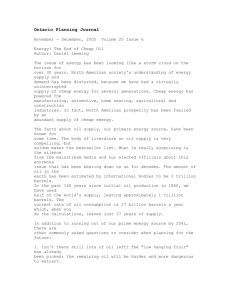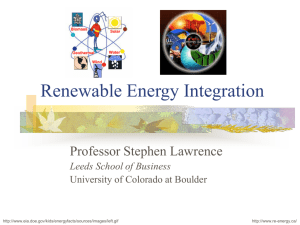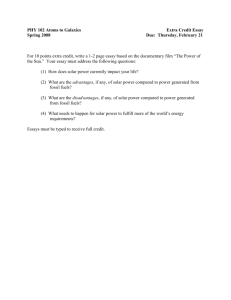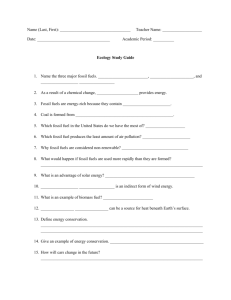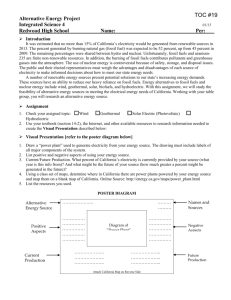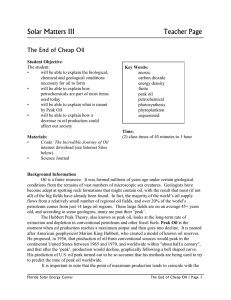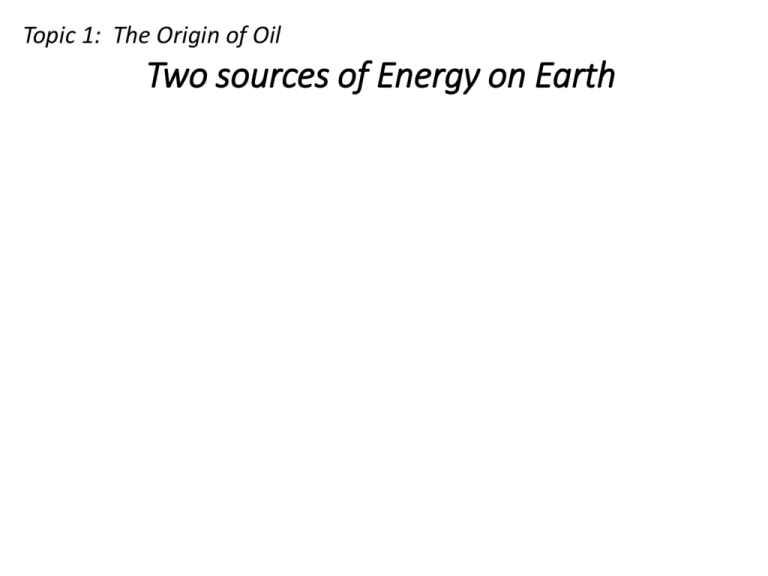
Topic 1: The Origin of Oil
Two sources of Energy on Earth
Topic 1: The Origin of Oil
Two sources of Energy on Earth
BIG ENERGY FLUX
Solar energy drives:
Wind, photosynthesis, ocean thermal energy,
hydrologic cycle. Fossil fuel = stored solar energy.
SMALL ENERGY FLUX/SOURCE
Energy sourced by accretion of the Earth system:
Geothermal, tides, presence of fissionable elements
Topic 1: The Origin of Oil
Power versus Energy
Power = energy per unit time
1 Watt= 1 kg m /s3 = 1 Joule/s
Energy = kWh (kiloWatt hour)
Power Provided From the Sun
340 watts/m2
(Power of sunlight per square meter) x (area of all continents)
170 watts/m2
x
148 x 1012m2
= 25,000 TW
Global Energy Consumption is about 12 TW
Earth’s stored + radioactive heat= 44 TW
Topic 1: The Origin of Oil
BIG ENERGY FLUX (25,000 TW to the continents)
Topic 2: What makes Oil so Special?
BIG ENERGY FLUX
Solar energy drives:
Wind, photosynthesis, ocean thermal energy,
hydrologic cycle. Fossil fuel = stored solar energy.
SMALL ENERGY FLUX/SOURCE
Energy sourced by accretion of the Earth system:
Geothermal, tides, presence of fissionable elements
Topic 2: What makes Oil so Special?
A partial list of products made from Petroleum (144 of 6000 items)
One 42-gallon barrel of oil creates 19.4 gallons of gasoline. The rest (over half) is used to make things like:
Solvents
Diesel fuel
Motor Oil
Bearing Grease
Ink
Floor Wax
Ballpoint Pens
Football Cleats
Upholstery
Sweaters
Boats
Insecticides
Bicycle Tires
Sports Car
Nail Polish
Fishing lures
Bodies
Dresses
Tires
Golf Bags
Perfumes
Cassettes
Dishwasher
Tool Boxes
Shoe Polish
parts
Motorcycle
Caulking
Petroleum Jelly Transparent Tape
Helmet
CD Player
Faucet Washers Antiseptics
Clothesline
Curtains
Food
Basketballs
Soap
Antihistamines
Purses
Shoes
Dashboards
Cortisone
Deodorant
Footballs
Putty
Dyes
Panty Hose
Refrigerant
Percolators
Life Jackets
Rubbing
Linings
Preservatives
Vitamin
Capsules
Alcohol
Skis
TV Cabinets
Shag Rugs
Electrician's Tape
Tool Racks
Car Battery
Epoxy
Paint
Insect
Oil Filters
Cases
Mops
Slacks
Repellent
Umbrellas
Yarn
Fertilizers
Hair Coloring
Roofing
Toilet Seats
Fishing Rods
Lipstick
Denture
Linoleum
Ice Cube Trays
Synthetic Rubber
Topic 2: What makes Oil so Special?
Fossil fuel has made energy cheap!
Power = energy per unit time
1 Watt= 1 kg m /s3 = 1 Joule/s
Energy = kW h (kiloWatt hour)
Work by one person
50 W x 24 hrs 1000 Wh or ~1 KWh/day
1 KWh per day is about what’s required to keep a 100 W light bulb
going for 10 hours.
We pay about 32¢ per KWh for electricity on Oahu - so we get the
equivalent energy of a hard-working person for 32¢ per day.
1 “Barrel of oil equivalent (BOE)” = 1700 KWh or 1700 days or 1700 x
20= 34,000 hrs of hard human labor.
The expansion of human civilization is strongly linked to
access to cheap, high-quality energy sources.
World Population and Oil Production
Millions of People, 10,000's of Barrels/day
8000
7000
6000
5000
4000
World Population,
millions
Oil Production, 10,000
barrels/day
3000
2000
My Birthday
1967
1000
0
1750
1800
1850
1900
Year
1950
2000
10
“Soil is the catalyst used to
turn oil into food.”
Modern agriculture requires more than ten units of fossil
fuel energy for every unit of energy eaten. Take away
fossil fuels, and productivity will decrease greatly.
About 85% of our food and staples come to Hawaii on
ships that burn oil. The average North American meal
travels 1,500 miles before it gets to your plate.
In 2010 about 80% of Hawaii’s electricity is generated from
oil. Today its about 70%. In 5 yrs we’ve added about 10% of
energy from renewables!
Topic 3: What’s the Problem?
Petroleum reserves and usage
Copyright © 2014 John Wiley & Sons, Inc. All
rights reserved.
Copyright © 2014 John Wiley & Sons, Inc. All
rights reserved.
90000
Oil production by region
70000
60000
50000
40000
30000
20000
10000
-
1965
1967
1969
1971
1973
1975
1977
1979
1981
1983
1985
1987
1989
1991
1993
1995
1997
1999
2001
2003
2005
2007
2009
2011
2013
Production, thousand barrels/day
80000
North America
South & Cent. America
Europe & Eurasia
Middle East
Africa
Asia Pacific
World
OPEC reserves history from
BP statistical review of
world energy 2010
OPEC reserves history from
BP statistical review of
world energy 2010 adjusted
over time for cumulative
production.
2010 World
Energy Outlook
Report by the
International
Energy Agency
(IEA)
Topic 4: Life without cheap oil, or life after peak oil
(see http://energy-reality.org/primer/)
Topic 4: Life without cheap oil, or life after peak oil
(see http://energy-reality.org/primer/)
Solar
Nuclear
Geothermal
Topic 4: Life without cheap oil, or life after peak oil
(see http://energy-reality.org/primer/)
Topic 4: Life without cheap oil, or life after peak oil
(see http://energy-reality.org/primer/)

